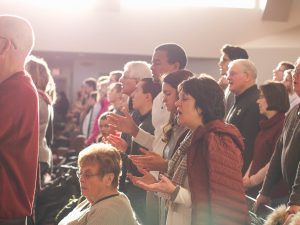“Did you hear that the NBA set a date for starting up again?” When a friend sent me that message recently, it instantaneously brought back vivid memories of watching the best part of sports––the playoffs and following the Toronto Raptor’s improbable championship run in 2019. But just as quickly, I noticed a new feeling that accompanied the first––an emotion that might be best described as a Venn-diagram overlap between regret, wariness, and deflation.
When COVID arrived at the shores of the life we knew, our lives were forced to change. After the dust had settled and the initial scramble gave way to new rhythms, we talked about the opportunity to recalibrate, to centre our lives around meaning and careful intentionality, rather than around our calendar apps.
For many of us, life before COVID was a constant cycle of playing catch-up: it seemed like the list of things we had to accomplish was longer than we actually had time for. COVID forced us to reckon with how we often lived our lives––being pulled by the current and the default. It was the real life version of Netflix’s “Are you still watching?” screen that pops up after three and half hours of binging The Office. Sadly, many of us have put our trust in things that over-promised their potential for imparting happiness, while ultimately under-delivering fulfilment.
New normal: education and technology
As we wonder what the new normal will look like, it’s tempting to just wait for life and university to return back to the way things were. NYU business school educator Scott Galloway, offers a forecast into how this global pandemic will disrupt the future of colleges and universities. He writes that, much like department stores, traditional universities will face obsolescence if they don’t reinvent the way they engage students. A major partnership between education and technology will be inevitable. We don’t need to wonder about this as a hypothetical. For many of us, 2020 will be a largely, if not completely, online school year. By one analysis, over 50% of international students and 30% of Canadian students have requested or are considering deferring their 2020/21 admissions. What remains to be seen is if this will prove to be a seasonal shift or a more permanent change in the climate of university.
Among other things though, Galloway believes that, while the method by which education is delivered will change, the commodity that these institutions are actually selling––credentialing––will not. Credentialing is the seal of approval that declares to the public that you are qualified.
“When you go to [an upper tier school], you know that your classmates are solid citizens who are qualified and have good EQ. If you get a job at Google, there’s a certain belief that [you’ve been vetted] enough to certify that you have very strong skills.The cruel truth of what pretends to be a meritocracy but is [in fact] a caste system is that your degree largely indicates or signals your lifetime earnings.” – Galloway
Here I believe that Galloway reveals the crux of an important issue. Though the geography of our classroom may change, there seems to be an enduring and insatiable need to earn our value and prove ourselves. It’s a heart-level drive that has no regard for context, pandemic or not.
Why university at all?
In this interlude that COVID has given us, one hard and uncomfortable question that must be examined is “Why do you want to go to university?”. Or perhaps for those already in college or university, why are you here? For those who are about to begin college or university, there’s a good chance that they’ll talk about all the doors and opportunities for a fulfilling career, a life of meaning, and a brighter future.
For others, post-secondary education is simply the next logical step. Just as Grade 7 must follow Grade 6, and just as another reboot must follow every Spiderman movie, university simply follows high school. After that is the uncharted future of adulthood. It’s just how things go.
But if we ask people who’ve graduated what lasting impact going to college or university has had on them, there’s a good chance that they’ll talk about the people and the relationships they were shaped by. Many will often cite the friendships they made, the groups they were involved in, and the people who influenced them, as the true value of their time in university.
The true value of university
It’s curious that what we find is of most value after we graduate often ends up being at odds with what we originally anticipated or hoped prior to university. Perhaps we would do well to question what value university really brings toward our lives before we move on from this place. If it’s true that our faith is not just one of many separate compartments in our lives, then we must instead ask ourselves “How does my faith shape how I answer the question: ‘Why do I want to go to university?’”
What if university isn’t right for you? At least, not for the reasons you might think it is. What if it would rob something of your life to take this option simply because it presents itself as the next logical step, the next episode that automatically starts before the credits even begin rolling?
For all the benefits that a digital classroom will bring, Galloway concedes that there is an intangible experience that only attending university in person can deliver:
“I joined crew and pushed myself harder physically than I ever imagined possible. I fell in love for the first time. I gained resilience when I had my heart broken. I met people from different economic backgrounds who gave me a sense of empathy.”
If learning information or a diploma is all that university and college is ultimately about, then you could make a case that completing an entire degree online might be the most efficient vehicle. But if it is, at least in large part as Galloway admits, about walking through life with other people, then a video lecture is ultimately incomplete.
Taken a step further, if our faith and relationship with Jesus is about completely reorienting our lives towards God and to others, then deciding which college or university you’ll choose to go to is hardly the First Question or even the main question. How small would our lives be if we simply graduated from one thing to another, from one milestone to the next?
I’ve heard it put another way––we are not students who happen to be Christians. We are Christians who happen to be students. Though in this season of life I am a student, it will come to an end after a short time. After that, an internship, a family business, or perhaps something else equally as temporary will take its place, before also coming to an end. Our identity must lie in something lasting and thus guiding: to be a forever child of God. Experiencing God’s generous love towards me and loving the people around me become co-acting forces, each giving drive to the other.
How small would our lives be if we simply graduated from one thing to another, from one milestone to the next?
Through this lens, loving God and loving people is the ultimate aim of our lives. Being a student in university, or being anything for that matter––a barista, an entrepreneur or even a school dropout—is simply a place to live that out.
Finding a path forward
Perhaps then, we’ve been coming to university with the wrong set of questions. Perhaps the First Questions to explore before which campus to go to needs to be, “Who has God created me to be?” and “Where can I see an opportunity to love God and love people?”
I wonder if asking this question might see more of us choosing another route to life after high school. Maybe it’s a gap year to build a foundation for our faith, or perhaps staying in a small town college instead of moving to a major city so that we can continue investing in our friendships from high school. Perhaps finding a trades job or working for my family business is how we could love God most. Or maybe going to university might be the way to go, but mostly because meeting people from all kinds of backgrounds will teach me about compassion and give me a chance to walk through life with others.
And if you find yourself in a digital semester, what would it look like to build intentional relationships? Perhaps it could look like initiating a study group with your class or adding them on Facebook. Or perhaps it’s carving out a regular time to call or see a handful of friends, talking about what’s been hard, good and meaningful.
If we took the time to ask those who have gone ahead of us––older friends, parents, siblings or mentors––in what lasting way college or university has impacted them, I wonder if there’s a good chance that they’ll talk less about what they studied, and more about the people and the relationships they were shaped by.
And so before we freely embrace the return of the playoffs and before the next Netflix episode automatically plays, perhaps we should consider pausing, lest we let ourselves be caught up and carried along in the current towards the unexamined life.
Would it be so that this current pause in life finds us quietly but determinedly wrestling well with the First Questions: who does God say I am and how does that shape the way I think about the rest of my life?
"*" indicates required fields
Share this!
About the Author





